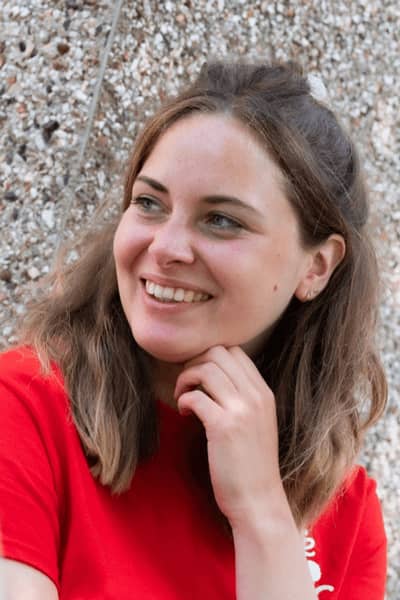Student Profiles
Our students tell us about their experiences of studying at Lancaster including, why they chose their courses, tips and advice for someone starting the course, and insight into their dissertation topics.
Please note that the choice of optional modules and teaching staff can vary from year to year.
Ellie Ball: MA Film Studies
Nationality: British/ UK Citizen
Course: Film Studies : MA
Tell us about your education and work experience before starting the course:
Prior to my postgraduate course, I had taken a BA (Hons) in English Literature at Lancaster University. As a part of my undergraduate degree, I chose to experiment with my optional modules, choosing core film modules from the Lancaster Institute for the Contemporary Arts (LICA) degree scheme. Before I started this course, I had limited creative work experience. In the past, I have mainly had customer service jobs, this course has allowed me to gain a variety of creative experiences.
Why did you choose this course?
During my time at Lancaster University (as an undergraduate), I fell in love with film and subsequently the LICA department. The course content was always fascinating, as were the chosen filmic texts. The department has an incredibly friendly and welcoming atmosphere, and the lecturers are all lovely. The staff are incredible; they all work very hard and are wholly dedicated to the discipline of film and their students. I was thrilled to hear LICA were developing a Film MA and could not think of a better department to study with.
What have you enjoyed studying most during the course?
Despite the challenges posed by Covid-19; I have enjoyed the practical elements of this course the most. I was a bit nervous approaching the practical modules as I had limited experience with this area of film studies. Both modules turned out to be some of my favourites, I was glad to try something new and discovered I enjoyed practical work even more than theory-based study! Maryam (who ran both modules) made the process very enjoyable, explained everything with great clarity and really encouraged a more creative side out of me!
Tell us about the optional modules you chose to study as part of this course.
An optional module I particularly enjoyed was ‘African American Cinema’. This module was packed full of context, exploring the African American role within cinema from its inception to this day. I really enjoy studying the historical context behind cinema, I would recommend you take this module also if you have the opportunity. Jonathan (who ran the module) found a way of making rather complex material accessible and encouraged interesting discussions throughout the seminars.
Have you undertaken any practical film projects during your course? If so, how was this experience?
I took two practical modules this year, ‘Experimental Cinema: Theory and Practise’ and ‘Short Film Production’. Experimental Cinema was my favourite out of the two modules, I really enjoyed working on my final piece and was very proud of the outcome. Personally, I believe practical modules give you a greater sense of achievement and are important for having creative experience. Short Film Production was also amazing, it was nice to take on a real production role and gain an insight into the professional world.
What are you planning to explore in your dissertation?
The theme of my dissertation pivots around the figure of the “aging New Hollywood star”. I am examining the work of key stars from the New Hollywood era, under the lens of Stardom theory, evaluating how each star’s persona has modulated with age.
What advice would you give to someone who was about to start this course?
The best advice I could offer someone beginning this course would be to; prepare, get fully involved and enjoy. Prepare the best you can by emailing lecturers, weighing out potential modules and most importantly read/watch around the things you genuinely enjoy within film. Get involved in everything the LICA department has to offer, don’t be afraid of putting yourself out there! The LICA department always email students with exciting opportunities – take as many of these as you can. Finally, enjoy the experience, I wish I could complete the year all over again!

Kate Howell: MA Arts Management
Nationality: British
Course: Arts Management : MA
Tell us about your education and work experience before starting the course:
I had previously studied English Literature at undergraduate level and then pursued a career in international development, working and volunteering for not-for-profit organisations in the UK and abroad.
Why did you choose to study this course?
The Covid-19 pandemic gave me the space and time to reconsider my career path and pursue my dream job. I’ve always loved the arts and I had developed project management skills in my previous roles, so I felt that this course was the perfect way to combine these two areas. I was also attracted to the practical nature of the course and the modules that would enable me to work directly with arts organisations.
What have you enjoyed studying the most during the course?
I’ve enjoyed the flexibility of the course, in particular the ability to explore and write about areas of personal interest.
Tell us about the arts organisation you worked with as part of this course. What was this experience like?
Unfortunately, due to Covid we had little direct contact with the arts organisation for our project – The Dukes. However, I was fortunate to work as an intern for two local arts organisations, More Music and Deco Publique which allowed me to experience working closely with arts organisations.
Which topic did you explore in your research dissertation?
I explored how arts organisations work with refugee third sector organisations (organisations who support refugees and people seeking asylum) to facilitate participatory arts activities. I used a case study design and explored how arts organisations in the Lancaster and Morecambe area have worked with RTSOs on activities and projects.
What have you been doing since completing the course?
After working as an intern I’ve continued to work for Deco Publique and More Music on a freelance basis which is allowing me to explore different areas of the arts and culture sector and build a clear idea of the direction I would like to take.
What advice would you give to someone who was about to start this course?
Take the opportunity to engage with local arts organisations, both through voluntary and paid work.

Bo Rui: MA Design Management
Nationality: China
Course: Design Management : MA
Tell us about your education and work experience before starting the course:
My major in college was digital media art. During my study in college, I also learned about design management and design consulting.
Why did you choose to study this course?
I chose this course because I am very interested in the relationship between business, design and user psychology. I also hoped to learn more about different fields and apply them to the design process.
What have you enjoyed studying most?
In some modules, our task is to establish a company's structure step by step, including the company's core values, business canvas and some visual contents. This includes not only the test of design ability, but also the test of business and user psychology research. I think these are good exercises that give me more opportunities to expand imagination and practice how to successfully implement a business plan.
The different design methods learned in the course of Design Research Methods have been significant for my study this year. Choosing the right method has accelerated my thinking process.
What are you planning to explore in your dissertation?
My research mainly focuses on the use of different design methods for service design and how to improve and enhance the policies for social problems in a certain field. In the future, I may further study how service design can make social goods.
What advice would you give to someone who was about to start this course?
This course will not only test your design ability, but also test how to apply interdisciplinary knowledge in different fields to your design practice. You might find this challenging, but you will gain a lot if you stick at it.


